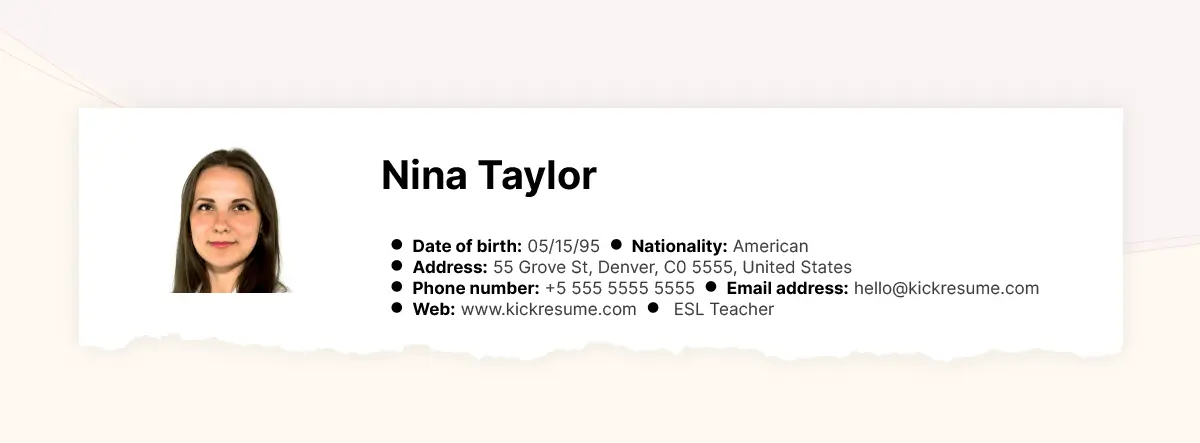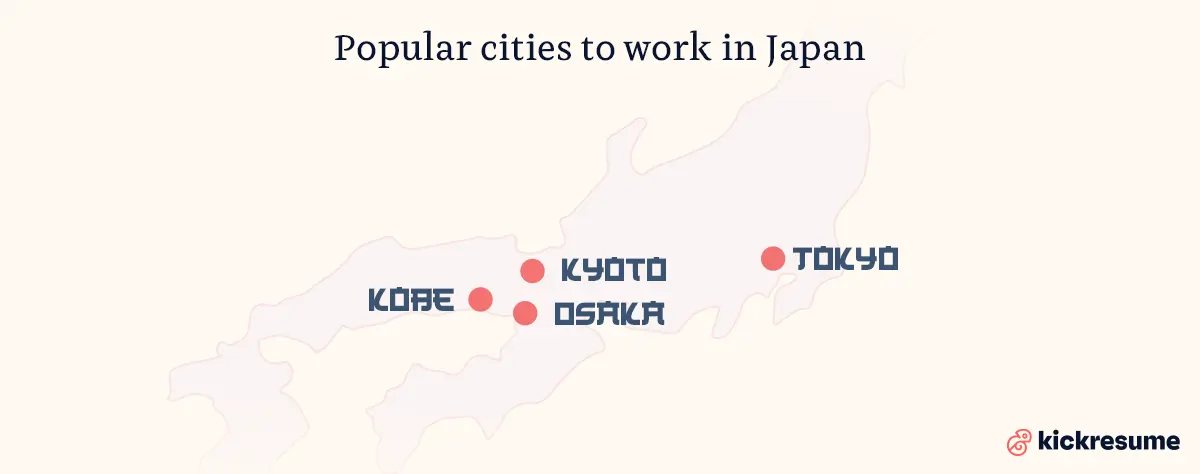If you’re lucky, you get to see Mt.Fuji as your flight descends into Tokyo.
And it’s quite the majestic view.
Japan’s emblematic volcano in all its glory, surrounded by enchanting forests, traditional Shinto shrines, and modern buildings.
You could say this is Japan in a nutshell. A mix between the old and the new, tradition and modernity, nature and man-made.
It’s not surprising why you're wondering how to find a job in Japan as a foreigner.
In this comprehensive guide you'll find tips that will help you navigate Japan's job landscape!
- Is it easy to get a job in Japan?
- How to apply for a job in Japan?
- Work visa in Japan
- Resume and cover letter tips
- Japanese job search engines
- How to find an English teaching job in Japan
- Volunteer jobs in Japan for foreigners
- Popular cities to work in Japan
- Summer jobs in Japan for foreigners
- American companies hiring in Japan
- Salaries in Japan
Is it easy to get a job in Japan?
Ok, that sounds great and all, but is it easy to find a job in Japan as a foreigner?
It depends on what kind of job you're looking for. Is it a low-skill, mid-skill, or a highly skilled job?
The truth is that Japan has been rather strict when it comes to migration, with low-skill and mid-skill jobs virtually unattainable for foreigners.
Nevertheless, times are changing and because of its aging population and low birth rates Japan has been reassessing its immigration policies. Opening room for foreigners to apply to mid-skill jobs, like caregiving and construction work.
With that said, low-skill jobs are still not the way to go if you want to find a job in Japan, though that too might change soon.
As for highly skilled jobs, Japan is much more lax with its migration policies with them. This is particularly true if your skills are in demand. However keep in mind that Japan has a high educated population, so the job market is very competitive. Of course, this difficulty gets lowered if you:
- Speak Japanese
- Have a university degree
- Have 3+ years of experience in a particular high-skilled area
- Are a language teacher
The last one in particular is the easiest way to find a job in Japan as a foreigner. Especially if you’re a native English speaker and are looking to teach English. You can find more about teaching in Japan further down in this article.
If you'd like to stay within the Western Hemisphere, check out: How to Find a job as a Foreigner in Canada or perhaps you fancy some tea and would love to find a job in the UK?

How to apply for a job in Japan?
Just like applying for a job in your home country, it always pays off to be prepared before you apply for a job. Here’s what you need to get in order before applying for a job in Japan:
- Resume/cover letter: Japan has a different approach from western countries when it comes to resumes and cover letters. It’s crucial for you to understand these differences before submitting them. You can find more details in the section below, “Resume and cover letter tips”.
- Job search engines: Usually you want to wait until you have your visa before you start searching for jobs abroad. However, in Japan the best way to get a visa is to have a company sponsor you. So in this case this is one of the first steps you should take. We have a chapter below where we list foreigner-friendly job search engines.
- Certificate of Eligibility: This is a document needed before you can apply for your work visa. If you’re abroad it's usually done by the company sponsoring you. You can find more details in the section below, “Work visa in Japan”.
- Visa: Japan is very selective when handing out visas and since there are many types of work-related visas, it's important to apply for the one that fits your criteria. You can also find more information in the section “Work visa in Japan”.
Work visa in Japan
As with most countries, Japan requires a work visa if you want to work in the country.
And as you'd expect from a bureaucratic process, there are a few things you need to prepare before you can even begin applying for a work visa.
Here’s what you need:
- Certificate of Eligibility: This document is usually applied for by your potential employer in Japan. It certifies your nationality, the type of visa you'll be applying for and also notes your Japanese sponsors (usually your employer to be) that will act as your patron for your visa.
- Recent photo: Take the photo facing forward and with a blank background. It must then be cropped to 4cm x 3cm (1.5” x 1.2”). Also, make sure to add your name at the back of the picture if you’re going to be mailing it to Japan’s Immigration Bureau.
Applying for work visa in Japan
Since there are a variety of jobs, there are several categories of work visas (30 of them!) that you can apply for in Japan and they each have their own unique set of requirements.
Having said that, most foreigners fit within these three major work visa categories:
1. Basic Working Visa: This is the most common visa granted to those who are seeking employment in Japan. It requires a university degree, a company sponsor and lasts between 1-3 years (depending on your sponsor). Here’s a few examples of who can apply for a basic work visa in Japan:
- Artist
- Business Manager
- Journalist
- Instructor
- Skilled laborer
- Medical services
- Engineer
- Intra-Company Transferee
2. Specified Skill Visa (SSV): This visa is Japan’s answer to its labor shortage. It was introduced in April of 2019 and will allow 345,000 foreign workers to enter Japan. It's given for a period of 5 years and is limited to renewals.
Also, know that you do need to be proficient in Japanese in order to apply for this visa and you'll not be allowed to bring your family members.
The SSV visa covers the following labor roles:
- Food and beverages
- Restaurants/catering
- Hospitality
- Nursing care
- Processing of materials
- Construction
- Industrial machinery
- Vehicle maintenance
- Shipbuilding
- Agriculture
- Fisheries
3. Highly Skilled Professional Visa: This visa was introduced in 2012 in order to bring in highly skilled professionals into Japan. It's for those with advanced careers such as, senior business managers, specialized technical workers, and academic researchers.
Be aware that apart from meeting the required work skills, this visa gets granted to the applicants who score higher on a “point” system. This system is based on your skills, age, and your Japanese fluency.
For more info on Japan’s visas.

Resume and cover letter tips
Resume
When crafting your resume for Japan’s labor market apply the golden rule of Zen minimalism — less is more.
That means, staying away from flashy, “kawaii” resumes and instead opting for something more traditional, along the lines of a curriculum vitae (CV). Similar to what you'd write for in academia.
Also, keep in mind that in Japan it's common to include personal information that you wouldn’t usually include in an American resume.
For example, here’s what you'll usually find in the contact information section:
- Headshot
- Name
- Nationality
- Age and date of birth
- Visa status
- Address
The rest of your resume should be similar to what you'd write in your home country, it should be in a chronological style and include your professional summary, work experience, and education.
Hobbies or other personal related resume sections aren't as common in Japanese resumes, but you can include them if you feel they align with the job you’re applying for.
If you need to get inspired, check out resume samples (The minimalist resume template is perfect for Japan).
Cover letter
Like with the resume, Japanese cover letters should be simple and to the point.
Write it the same way you would write it back home and stay focused on the job, not Japan.
However, it's a good idea to state how you could add value to the company even though you're from abroad.
If you’re not sure about cover letters, these cover letter samples can point you in the right direction.
Japanese job search engines
There are many websites where you can look to find jobs in Japan as foreigner. However, not all are created equal. Here are a few foreigner-friendly websites you can use to find a job in Japan:
- Gaijinpot: This online platform catered towards foreigners is intuitive and easy to use, you can find thousands of job listings ranging from entry-level to senior-level positions.
- Daijob: Similar to Gaijinpot you can also browse through thousands of job postings ranging from various levels of experience. Nevertheless, it’s good to note that most non-language opportunities require a high level of Japanese (JLPT N1).
- Jobs in Japan: Started by an American who wanted to help foreigners navigate the Japanese career landscape, this popular website has a variety of job postings ranging from English teaching to web development and more.
- Career Cross: This simple to use and straightforward website offers a plethora of job listings to sift through. Similar to Daijob, most non-language job listings require an advanced level of Japanese (JLPT N1 or N2).
- Wantedly: An online platform that's perfect for those who are inclined towards tech jobs. However, a proficient level of Japanese is needed for most job listings (JLPT N1 or N2).
If you can't find what you’re looking for in these websites, another option is to use job search engines you’re familiar with, like LinkedIn and Indeed. These two websites have been growing in popularity in Japan and if you already have an account, all you have to do is switch your location to Japan and you’re good to go.
How to find an English teaching job in Japan
Like we stated before, most jobs available for foreigners in Japan are those that deal with language. The easiest being if you’re a native English speaker. In such a case, apart from using job search engines you can apply for jobs at private language schools like:
Another option for teaching languages in Japan as a foreigner is to go through the Jet Program, which is run by the Japanese government. However, this is a highly competitive program. Though, if you do manage to get in, it pays off, as it is said to come with great benefits.
Volunteer jobs in Japan for foreigners
Most foreigners searching for volunteering jobs in Japan do so on a tourist or working holiday visa and volunteer at an organization like WWOOF in Japan. Another good organization to apply for volunteer work would be Japan Cat Network.
Both offer great opportunities to receive a discounted and sometimes free room and board. Sounds great! You get to save money so that you can spend it somewhere in Akihabara.

Popular cities to work in Japan
Unless you’re going to be working as a language teacher in Japan, most foreigner jobs will be centered around Tokyo. This is especially true if your Japanese is lacking.
However, this doesn't mean it's impossible to find jobs in other cities, it just takes a little bit more work. These three bustling cities can also be a good place for a foreigner looking for a job in Japan:
Kobe: Yes, Kobe beef is marvelous and so is the lovable laid-back city which its name derives from. To top it off, this city is filled to the brim with international schools.
Osaka: The foreigner population of Osaka stands at over 200,000. It's a great city for those who are looking for jobs in the industrial sector. And if you're into it, Osaka does have a thriving nightlife.
Kyoto: Like Tokyo, Kyoto was once the capital of Japan. Smaller and more charming, Kyoto blends traditional and modern architecture in a way that just works. It can be rather touristy in the summer, but that means it's easier to mingle with other English-speaking people.
Summer jobs in Japan for foreigners
If you've already obtained a visa to work in Japan, you can find summer jobs in the following websites:
Do note that such jobs will most likely be part-time, low-skill and require fluent Japanese. If your Japanese is still not up to par, the option to search for jobs in English is still there, however it will take you a bit longer to find a job and it will be harder to answer that pesky job interview question, "Why should we hire you?".
American companies hiring in Japan
There are many American companies with branches in Japan.
It might be that you already work in one and it wouldn't hurt to check if they're currently hiring in Japan.
If they're and you're qualified for the job then the answer on how to find a job in Japan as foreigner might be resolved, as this is an easy way for you to get an intra-company transferee visa.
For those who don’t have such luck, these American companies have branches in Japan and are constantly looking for spots to fill:
- Goldman Sachs
- Disney
- Boeing
- Procter & Gamble
- Johnson & Johnson
- Hard Rock Café
- Tony Roma’s
- Starbucks
Salaries in Japan
Ok, so how much should I expect to get paid in Japan?
It depends on a few factors such as, how much experience you have, your education level and if your skills are in demand.
If for example you want to work in the hospitality or food industry, your pay salary would be around 2.0 million to 2.8 million yen ($18.3 - 26.6k in USD).
On the other hand, if you have a university degree and want to work as an English teacher, you can expect to make between 2.8 million to 3.96 million yen ($26.6 - 34k in USD) per year after completing the Jet Program.
In the end, the average salary for a foreigner working in Japan is 2.5 million yen ($22.8K in USD)
That might not seem like a lot if you come from a western country, but keep in mind that this kind of money allows you to have a very comfortable life in Japan.
Feeling prepared to embark on a job hunt in Japan as a foreigner? Brilliant! To bolster your chances, let our tool transform your LinkedIn profile into a polished, professional resume that is ready to impress Japanese employers.




